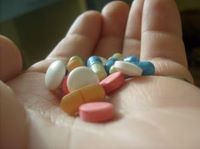
Hydrocodone
Hydrocodone Addiction and Treatment
The drug Hydrocodone is a opioid drug that comes from both thebaine and codeine. Both thebaine and codeine are opiates that occur naturally, and they are used together in the production of hydroco.
This is a drug that is taken orally and it acts as both an antitussive and a narcotic analgesic as well. It comes in a variety of different preparations, including capsules, tablets, and even as a syrup.
In the past few years, the production as well as the sales of Hydrocodone has exploded, and unfortunately, so has its’ illegal usage. Now days this drug is the most prescribed opiate of all, and you will generally see it marketed under names like Vicodin or Lortab.
How Hydroco Works
Hydrocodone works as a narcotic and would be prescribed to relieve mild to moderate pain. It also works as a cough suppressant. It works by binding with opioid receptors that are in both the spinal cord and the brain.
Most people find that this drug works even better than codeine does for cough suppression, and the pain relief provided is considered to be almost equal to that of morphine. This drug can be taken safely with or without food; however, if stomach upset occurs when taking it, then users may want to start taking it with food.
Hydroco Side Effects
There are a variety of side effects that may occur when taking Hydroco. Some of the less serious but bothersome side effects may include dry mouth, sweating, constipation, dizziness, nausea, tiredness, itching, muscle twitches, or decreased urination. There are also some more serious side effects that can occur, such as seizures, weak breathing, allergic reaction, unusual bleeding, extreme fatigue, severe weakness, unconsciousness, and yellowing of the eyes or skin. If any of these side effects occur you need to get medical help immediately. Hydroco can also be very habit forming and there is a chance that users can become both physically and psychologically dependant on this drug.
Hydroco Overdose
It is definitely possible to overdose on Hydrocodone and if you suspect an overdose you should be sure to seek medical attention immediately. Some of the symptoms to watch out for that could indicate an overdose include very slow, weak breathing, cold clammy skin, nausea and vomiting, excessive sweating, seizures, dizziness and weakness, unconsciousness, small pupils, confusion, or even a coma. If any of these problems occur medical attention must be sought immediately.
Urgent medical care is needed in the event of a Hydroco overdose. One of the first methods of treatment for this type of overdose is to make sure that you prevent the body from absorbing any more of the drug from the stomach. Also, both the respiratory and circulatory systems must be protected. Usually a patient with Hydrocodone overdose ends up in the ICU for extended medical care. Naloxone, which acts as a narcotic antagonist is often used to reverse the poisoning of this narcotic. Acetaminophen poisoning is another worry, which can damage the liver, and if this is a problem, then acetylcysteine is usually give to the patient to help in the protection of the liver.
Addiction and Abuse
Unfortunately, Hydroco is also a drug that is being abused more and more. Many researchers and physicians actually think that Hydrocodone may be the number one most abused prescription drug in America today. While the use of this drug is regulated, it is not as regulated as other drug, which is why many people find it easier to get this drug.
Some people go prescription shopping from doctor to doctor, others steal the drug, and some even forge prescriptions for Hydroco. On the street, just one pill can sell for between $2-10. A person can become addicted to Hydrocodone in just 1-4 weeks, and the addiction is very hard to break. It provides users with a soothing feeling, and many actually enhance the effects of the drug by drinking alcohol with it as well.
Breaking the addiction to Hydrocodone can be very tough, especially since it involves both physical and psychological addiction. It is very dangerous to totally stop this narcotic immediately, and withdrawal symptoms can occur, such as sweating, difficulty breathing, anxiety, vomiting, and extreme cravings.
So, those who are being treated for addiction have to be slowly withdrawn from the drug, and also may need some methadone treatment as well. While this takes care of the physical side of the addiction, drug rehab therapy is also usually needed to treat the psychological addiction. Usually drug rehab programs can offer supportive therapy and psychological counseling that can help to treat the addiction.
More Opiate Detox Information
Drug Detox Information
Rapid Detox


